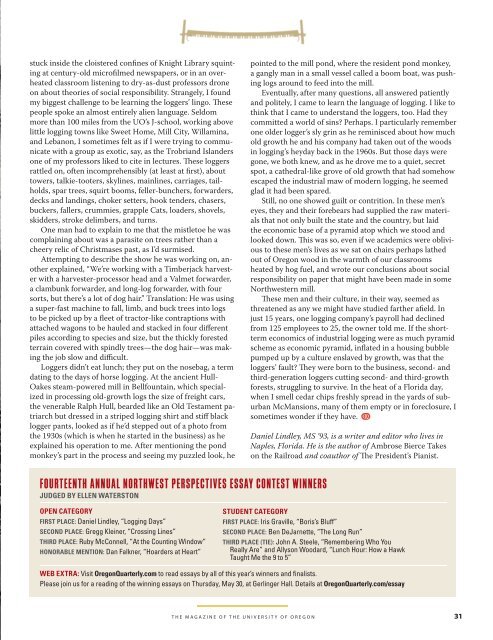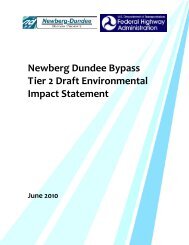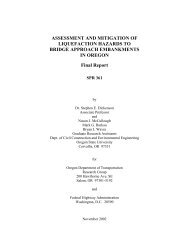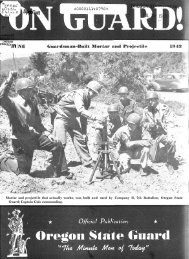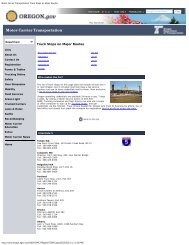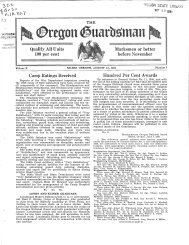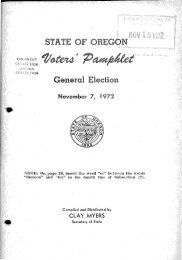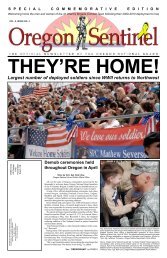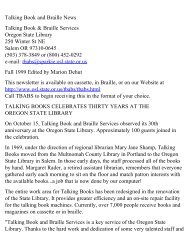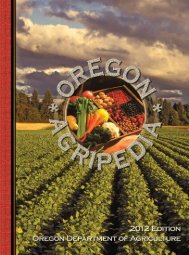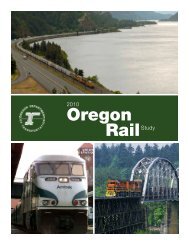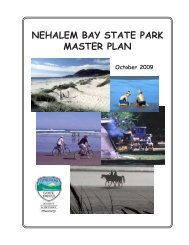Summer 2013 - Oregon State Library: State Employee Information ...
Summer 2013 - Oregon State Library: State Employee Information ...
Summer 2013 - Oregon State Library: State Employee Information ...
Create successful ePaper yourself
Turn your PDF publications into a flip-book with our unique Google optimized e-Paper software.
stuck inside the cloistered confines of Knight <strong>Library</strong> squinting<br />
at century-old microfilmed newspapers, or in an overheated<br />
classroom listening to dry-as-dust professors drone<br />
on about theories of social responsibility. Strangely, I found<br />
my biggest challenge to be learning the loggers’ lingo. These<br />
people spoke an almost entirely alien language. Seldom<br />
more than 100 miles from the UO’s J-school, working above<br />
little logging towns like Sweet Home, Mill City, Willamina,<br />
and Lebanon, I sometimes felt as if I were trying to communicate<br />
with a group as exotic, say, as the Trobriand Islanders<br />
one of my professors liked to cite in lectures. These loggers<br />
rattled on, often incomprehensibly (at least at first), about<br />
towers, talkie-tooters, skylines, mainlines, carriages, tailholds,<br />
spar trees, squirt booms, feller-bunchers, forwarders,<br />
decks and landings, choker setters, hook tenders, chasers,<br />
buckers, fallers, crummies, grapple Cats, loaders, shovels,<br />
skidders, stroke delimbers, and turns.<br />
One man had to explain to me that the mistletoe he was<br />
complaining about was a parasite on trees rather than a<br />
cheery relic of Christmases past, as I’d surmised.<br />
Attempting to describe the show he was working on, another<br />
explained, “We’re working with a Timberjack harvester<br />
with a harvester-processor head and a Valmet forwarder,<br />
a clambunk forwarder, and long-log forwarder, with four<br />
sorts, but there’s a lot of dog hair.” Translation: He was using<br />
a super-fast machine to fall, limb, and buck trees into logs<br />
to be picked up by a fleet of tractor-like contraptions with<br />
attached wagons to be hauled and stacked in four different<br />
piles according to species and size, but the thickly forested<br />
terrain covered with spindly trees—the dog hair—was making<br />
the job slow and difficult.<br />
Loggers didn’t eat lunch; they put on the nosebag, a term<br />
dating to the days of horse logging. At the ancient Hull-<br />
Oakes steam-powered mill in Bellfountain, which specialized<br />
in processing old-growth logs the size of freight cars,<br />
the venerable Ralph Hull, bearded like an Old Testament patriarch<br />
but dressed in a striped logging shirt and stiff black<br />
logger pants, looked as if he’d stepped out of a photo from<br />
the 1930s (which is when he started in the business) as he<br />
explained his operation to me. After mentioning the pond<br />
monkey’s part in the process and seeing my puzzled look, he<br />
pointed to the mill pond, where the resident pond monkey,<br />
a gangly man in a small vessel called a boom boat, was pushing<br />
logs around to feed into the mill.<br />
Eventually, after many questions, all answered patiently<br />
and politely, I came to learn the language of logging. I like to<br />
think that I came to understand the loggers, too. Had they<br />
committed a world of sins? Perhaps. I particularly remember<br />
one older logger’s sly grin as he reminisced about how much<br />
old growth he and his company had taken out of the woods<br />
in logging’s heyday back in the 1960s. But those days were<br />
gone, we both knew, and as he drove me to a quiet, secret<br />
spot, a cathedral-like grove of old growth that had somehow<br />
escaped the industrial maw of modern logging, he seemed<br />
glad it had been spared.<br />
Still, no one showed guilt or contrition. In these men’s<br />
eyes, they and their forebears had supplied the raw materials<br />
that not only built the state and the country, but laid<br />
the economic base of a pyramid atop which we stood and<br />
looked down. This was so, even if we academics were oblivious<br />
to these men’s lives as we sat on chairs perhaps lathed<br />
out of <strong>Oregon</strong> wood in the warmth of our classrooms<br />
heated by hog fuel, and wrote our conclusions about social<br />
responsibility on paper that might have been made in some<br />
Northwestern mill.<br />
These men and their culture, in their way, seemed as<br />
threatened as any we might have studied farther afield. In<br />
just 15 years, one logging company’s payroll had declined<br />
from 125 employees to 25, the owner told me. If the shortterm<br />
economics of industrial logging were as much pyramid<br />
scheme as economic pyramid, inflated in a housing bubble<br />
pumped up by a culture enslaved by growth, was that the<br />
loggers’ fault? They were born to the business, second- and<br />
third-generation loggers cutting second- and third-growth<br />
forests, struggling to survive. In the heat of a Florida day,<br />
when I smell cedar chips freshly spread in the yards of suburban<br />
McMansions, many of them empty or in foreclosure, I<br />
sometimes wonder if they have.<br />
Daniel Lindley, MS ’93, is a writer and editor who lives in<br />
Naples, Florida. He is the author of Ambrose Bierce Takes<br />
on the Railroad and coauthor of The President’s Pianist.<br />
FOURTEENTH ANNUAL NORTHWEST PERSPECTIVES ESSAY CONTEST WINNERS<br />
JUDGED BY ELLEN WATERSTON<br />
OPEN CATEGORY<br />
FIRST PLACE: Daniel Lindley, “Logging Days”<br />
SECOND PLACE: Gregg Kleiner, “Crossing Lines”<br />
THIRD PLACE: Ruby McConnell, “At the Counting Window”<br />
HONORABLE MENTION: Dan Falkner, “Hoarders at Heart”<br />
STUDENT CATEGORY<br />
FIRST PLACE: Iris Graville, “Boris’s Bluff”<br />
SECOND PLACE: Ben DeJarnette, “The Long Run”<br />
THIRD PLACE (TIE): John A. Steele, “Remembering Who You<br />
Really Are” and Allyson Woodard, “Lunch Hour: How a Hawk<br />
Taught Me the 9 to 5”<br />
WEB EXTRA: Visit <strong>Oregon</strong>Quarterly.com to read essays by all of this year’s winners and finalists.<br />
Please join us for a reading of the winning essays on Thursday, May 30, at Gerlinger Hall. Details at <strong>Oregon</strong>Quarterly.com/essay<br />
THE MAGAZINE OF THE UNIVERSITY OF OREGON 31


